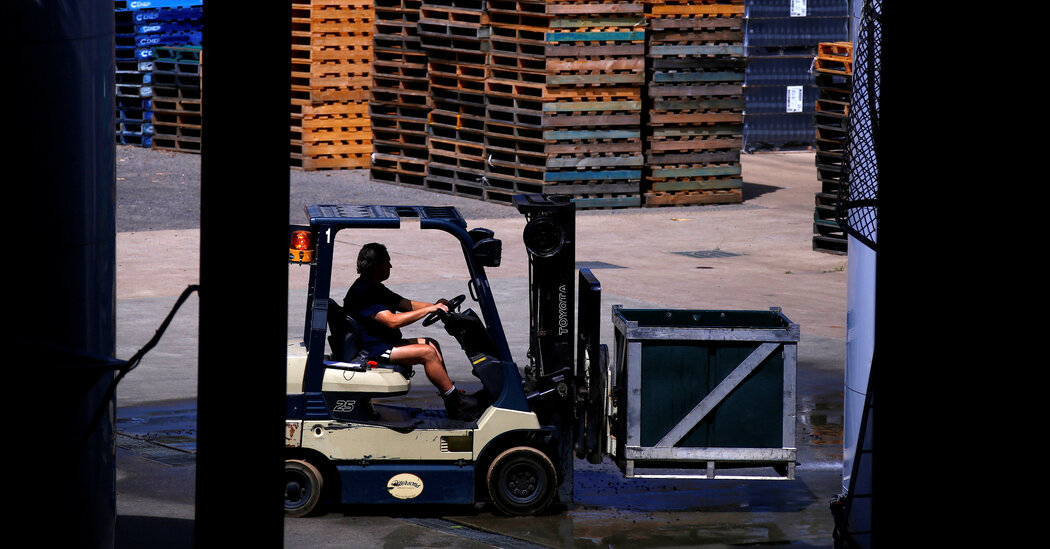A proposal, and the rapid retreat that followed, both elicited waggish mockery and highlighted a serious economic problem.
MELBOURNE, Australia — The Australian government has been trying all kinds of things to address a pandemic labor shortage: Letting international students work more hours. Reimbursing visa costs to lure backpackers. Easing isolation requirements for essential workers.
But letting children drive forklifts?
On Thursday, Prime Minister Scott Morrison quickly retreated from a proposal, which he had floated the day before, to lower the minimum age to get a forklift license. Currently it is 18 in many Australian states.
Mr. Morrison had planned, according to media reports, to present the notion to state and territory leaders as part of a suite of proposals to reduce regulatory requirements for crucial segments of the work force, as soaring coronavirus case counts keep many off the job.
But after the idea was greeted with sober concern in some corners of Australia and waggish mockery in many others, the prime minister emerged on Thursday with an announcement: “We agreed to proceed no further with the issue of 16-year-old forklift drivers.”
“We had a good discussion about it today, and it is not something that we believe, collectively, that is something we should be pursuing at this time,” he added.
The damage had already been done.
The chief minister of the Australian Capital Territory, Andrew Barr, said in an apparent dig at the prime minister that while the assembled leaders had supported “sensible and safe” measures to alleviate workplace shortages, “allowing 16-year-olds to drive a forklift was unanimously rejected by all states and territories.”
And while the proposal was short-lived, the fun Australians had with it was not. Imaginations ran wild as people took to social media to envision what a world with juvenile forklift drivers might look like.
“‘Children driving forklifts’ is just the kind of out-of-the-box thinking that could get this country back on track,” tweeted Josh Butler, a journalist.
“My 12 year old would like to volunteer for forklift driving,” said Dr. Neela Janakiramanan, a surgeon. “He has been double vaccinated but has no training or experience. This doesn’t concern him, because he’s 12 and can do anything.”
Still, it’s all fun and games until your local KFC runs out of chicken. As in many places around the world, supply chains in Australia have been snarled as the Omicron variant has swamped a country that had largely contained the coronavirus for almost two years.
In the United States, which is facing a shortage of truck drivers, a federal pilot program will allow 18-year-olds to operate heavy commercial trucks, relaxing rules that require truckers who cross state lines to be at least 21.
In Australia, ever-growing numbers of workers of all stripes have needed to take time off either because they tested positive or were considered close contacts and had to isolate. This has left Australia facing shortages of everything from sausages to toilet paper — once again.
Decision makers are having to walk a tightrope between keeping the flow of goods going and ensuring the health and safety of workers, said Elizabeth Jackson, a supply chain expert at Curtin University in Western Australia.
How the Supply Chain Crisis Unfolded
The pandemic sparked the problem. The highly intricate and interconnected global supply chain is in upheaval. Much of the crisis can be traced to the outbreak of Covid-19, which triggered an economic slowdown, mass layoffs and a halt to production. Here’s what happened next:
“We’re really facing a very, very dire decision-making process around how we’re going to keep the blood moving through our supply chains,” she said.
Another factor contributing to the labor crisis is border restrictions that until recently kept out migrant workers and backpackers, whom Australia has traditionally relied on to fill roles like forklift driving, Dr. Jackson added.
To ease the shortages, the Australian government announced last week that transport, freight and logistics workers would no longer have to isolate for seven days if they were identified as a close contact of someone who tested positive for the coronavirus. Instead, they can go back to work as soon as they test negative on a rapid antigen test.
Business groups are lobbying the government to ease isolation requirements for more industries, and some workplaces have required staff members to come to work even when positive for the virus. That has set off a backlash among unions, which have threatened to strike if appropriate health and safety measures are not taken.
“Australia is now experiencing our worst days since the start of the pandemic and the highest level of sickness ever seen in the work force,” the Australian Council of Trade Unions said in a statement this week.
“Essential workers are being expected to put themselves in harm’s way to keep the country going and in many cases without the protections they need,” it added.
Who will not be put in harm’s way are any workers dodging underage forklift operators.
As one person tweeted: “For sale: baby forklift, terrible condition.”


























